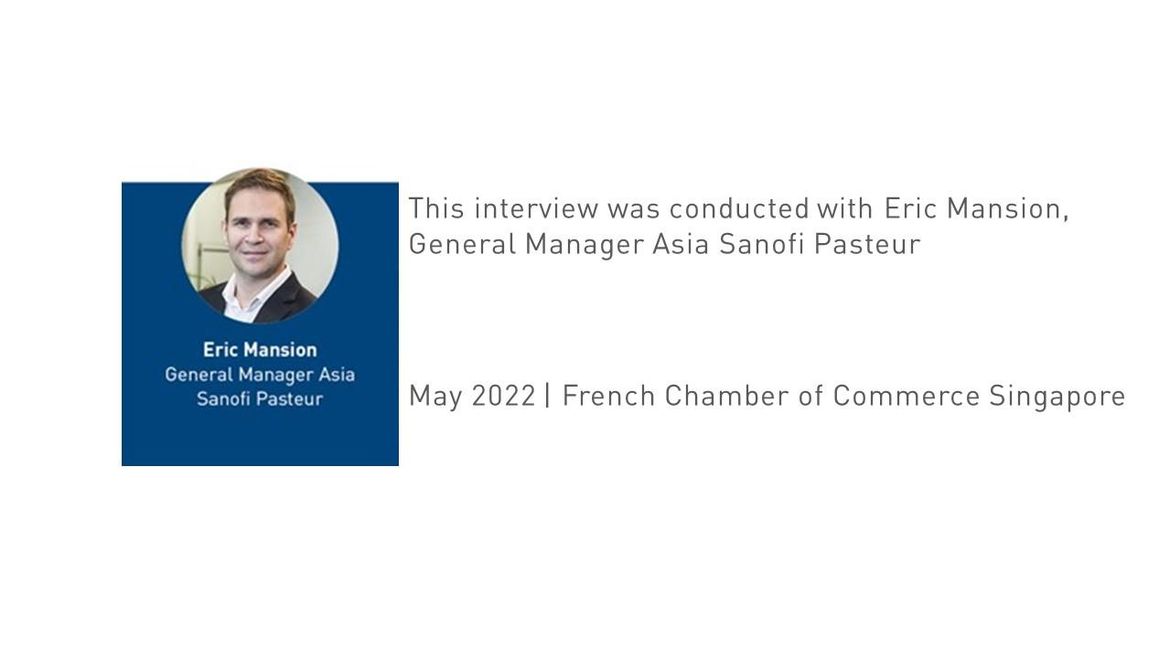Companies news • Analyses & Studies • Portraits • Publications
CEO Sustainability Series | Eric Mansion, General Manager Asia Sanofi Pasteur

As part of the Sustainable Business initiative, the French Chamber of Commerce in Singapore presents a leadership interview series where we invite CEOs and key executives to discuss crucial management qualities that drive successful sustainable transformation.
Question 1: What does sustainability mean to your organization in terms of ESG?
Sanofi’s social impact strategy aims to build a healthier, more resilient world by ensuring access to healthcare for the world’s poorest people. Integrated into the company’s Play to Win business strategy, Sanofi’s commitment to society will continue the fight against infectious diseases such as sleeping sickness and polio, etc, while accelerating its goals to reduce the environmental impact of its products and its worldwide operations.
Question 2: What have been or what would be the Challenges to face in pursuing a sustainable life-course immunisation?
Population ageing is a global issue and there is no exception for this region. By 2050, 62% of the Asia population will be made up of older adults – making Asia the oldest region in the world. For Singapore alone, the proportion of aged 65 and above in Singapore increased from 9% in 2010 to 15.2% in 2020.
When we get older, our immune function declines with age and with that, increases our chance of getting vaccine preventable diseases such flu and pneumonia. Vaccination has been recognised by World Health Organisation (WHO) and many medical professionals as one of the most cost-effective and -efficient methods of disease prevention.
According to the WHO, immunisation saves 2-3 million deaths per year and is widely recognised as one of the world’s most successful and cost-effective health interventions.
Despite the obvious benefits, adult immunisation is not widely adopted across Southeast Asia. Adult vaccination rates such as flu and pneumonia vaccines fall well below WHO’s target of 75% across this region. With diseases like flu and pneumonia comes an increased risk of health complications, the quality of life of our elderly population could be severely impacted, as well as the incremental healthcare and economic costs.
Health is wealth but protecting our older adults goes beyond monetary impact — healthy ageing allows ageing populations to enjoy a deserving quality of life in their golden years and contribute meaningfully to social situations and beyond.
Question 3: What are the opportunities to revisit the immunisation financing model to drive sustainability?
Given the growing demand that will continue to widen the gaps in health system financing
and delivery, resolving the inefficiencies alone will not be sufficient. Policy makers should revisit the life-course immunisation financing models being used to drive sustainability.
To address the financing challenges faced by the region, policy makers could consider adopting a co-payment adult immunisation financing system that combines the best of both taxes and social insurance model such as Medisave which has been implemented in Singapore.
Another mechanism to consider is dedicated earmarking taxes or for high impact disease and treatment areas like life-course immunisations.
With the Covid-19 pandemic, there is a growing awareness of vaccine and vaccination. Lifecourse immunisation should urgently be prioritized by policy makers as a vital part of healthy ageing policies in Southeast Asia, to lessen the impact of ageing societies and to protect against vaccine-preventable diseases.



